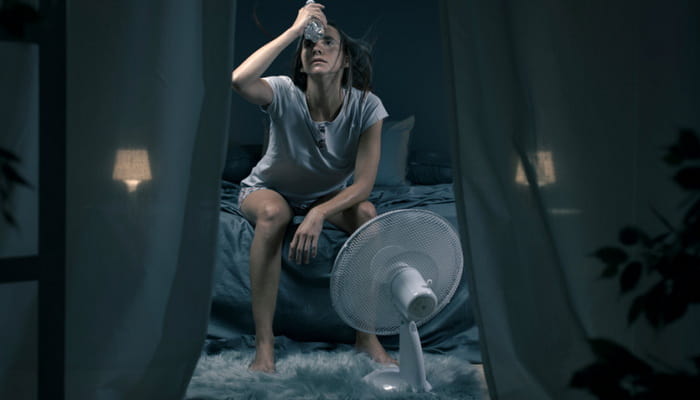Most people would probably agree that sweating at night and waking up in a sweat is definitely not the most pleasant experience. Night sweats are usually a normal reaction of our body to a decrease in body temperature if it exceeds the so-called thermal neutral zone, that is, in fact, the comfort zone of our body.
If you only sweat occasionally, it shouldn’t be a cause for concern, and you can probably fix it simply by changing your sleeping environment or behavior. But if you’re waking up wet more and more often, and your laundry box is never empty of wet pajamas and blankets, you might want to figure out why you’re sweating and how to stop it.
Sweating: reasons why you sweat at night
Heat and humidity. It all makes sense: If your bedroom is too hot, you’ll sweat. To solve this problem, constantly monitor the temperature and humidity levels in your bedroom. The optimal temperature for sleeping is about 18 degrees. If the temperature is higher, open a window or use a fan or air conditioner to cool the air.
Fabrics for bed linen and sleep. It is very important what you wear and what bedding you sleep on. Choose fabrics that are breathable and moisture wicking, which means avoiding fabrics like nylon, polyester, etc. Linen, bamboo rayon, and similar materials are best options.
Alcohol before bed. Not only can alcohol wake you up at night, but it can also make you sweat more than usual. Alcohol increases your heart rate and relaxes your airways, making it difficult to breathe, which can cause a rise in body temperature and sweating. Try drinking another calming drink before bed, such as tea, turmeric milk, or cherry juice, and see if that helps.
Stress and anxiety. When you experience extreme stress, your brain reacts by causing physiological changes in your body, increasing your heart rate and releasing hormones. These reactions may cause increased sweating. In general, stress-related sweating can occur at night and during the day, and many people may notice it before a job interview or important presentation. Before going to bed, you should try to calm down, engage in practices that calm the nervous system, etc.
Side effects of medications. Some medications may cause increased sweating. This can especially happen with medications such as antidepressants or diabetes medications. Not only that, but some pain relievers and supplements (such as calcium, niacin, etc.) can also cause increased sweating. If you think your night sweats are related to the medications you are taking, talk to your doctor – there may be alternatives that do not cause sweating.
Hormonal fluctuations. Hormonal changes may be an important cause of night sweats. If you are going through menopause or even due to hormonal changes during your menstrual cycle, you may experience increased sweating. Hot flashes, also known as hot flashes, are a common symptom of menopause caused by changing hormone levels. To cool down, try exposing your limbs, such as your feet and neck, or covering your head with a cool, damp cloth.
Health status. If none of the above cause’s night sweats for you, review your medical history or discuss the problem with your doctor, as certain medical conditions may cause you to sweat more during sleep than usual. For example, one possible cause, although very rare, is a sweating disorder called hyperhidrosis, which causes the body to produce too much sweat for unknown reasons. Although this is not a serious condition, it can be very unpleasant. Other diseases that can cause sweating include hypoglycemia (low blood sugar), hormonal disorders such as hyperthyroidism (an overactive thyroid gland), bacterial infections, gastroesophageal reflex disease, autoimmune diseases such as rheumatoid arthritis, neurological diseases and some forms of cancer.
Night sweats are also a common symptom of obstructive sleep apnea, a sleep disorder in which the airways relax and breathing stops momentarily. If you wake up choking or stop breathing for a moment, it is important to see a doctor.
While sweating during sleep is generally normal, you have several options to customize your sleep environment to help you stay dry and sleep soundly throughout the night. However, if waking up sweating becomes a regular occurrence, even after adjusting your room temperature and nighttime clothing, do not hesitate to visit your doctor, especially if you notice other health changes.








